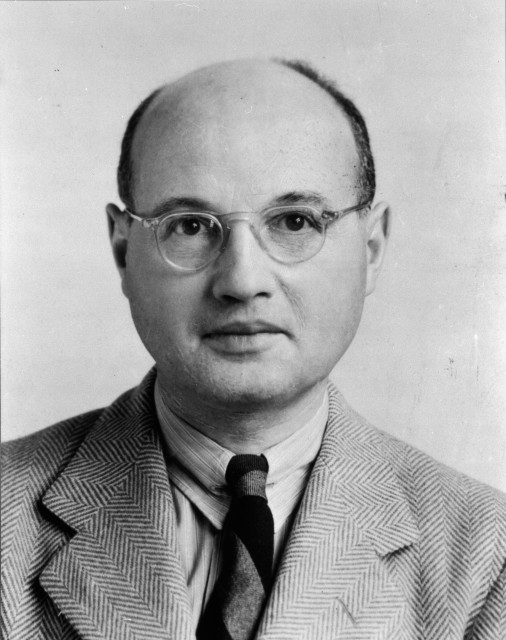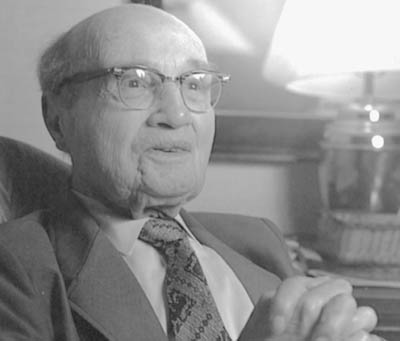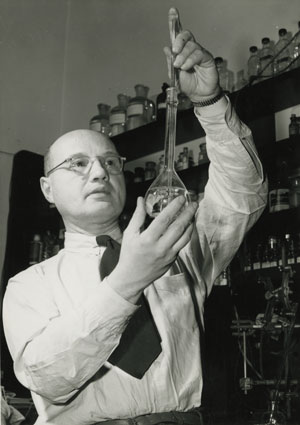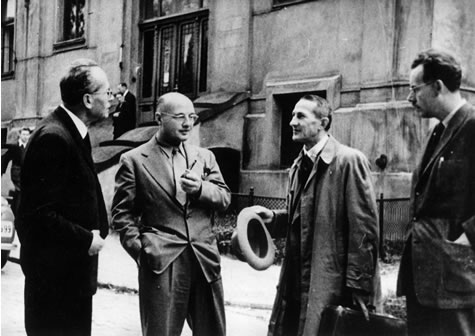<Back to Index>
- Chemist Izaak Maurits (Piet) Kolthoff, 1894
- Writer and Politician Marie Joseph Blaise de Chénier, 1764
- Vice President of the Confederate States of America Alexander Hamilton Stephens, 1812
PAGE SPONSOR


Izaak Maurits (Piet) Kolthoff (Father of Analytical Chemistry) (February 11, 1894 - March 4, 1993) was a highly influential chemist, widely considered the Father of Analytical Chemistry. He was given this title based on his development of analytical chemistry as a modern science. His research dealt with analytical and physical chemistry. His main research topics included potentimetry, conductometry, polarography, theory and application of indicators, acid - base equilibria and titrations in aqueous and non - aqueous media, formation, properties and aging of precipitates, adsorption, coprecipitation, post - precipitation, and induced reactions. He is also credited in development of the polarograph, an instrument for recording polarization of electrolytes. During World War II he served as chairman of the Committee on Analytical research Methods and supervisor of three research projects for the U.S. Government on synethic or "cold process" rubber.
Dr.
Kolthoff
believed that fundamentals of physical chemistry,
biochemistry, and pharmaceutical chemistry should also
apply to analytical chemistry, and by doing so further
developed the then artful analytical chemistry by
applying these fundamentals to analytical processes.
Motto: ”Theory guides, experiment decides.”
Izaak Kolthoff, the son of Moses and Rosetta Kolthoff, was born in Almelo, Netherlands. He is the youngest of three children. During his early education in high school, his first chemistry course allowed him to develop a keen interest in the subject. This inspired him to create his own laboratory in his kitchen. Some of his experiments involved hydrogen sulfide to the dismay of his family. After graduating from high school in 1911 he entered the School of Pharmacy at the University of Utrecht. The reason he began his studies in pharmacy rather than chemistry was that he lacked Latin and Greek, which at that time were prerequisites for admission to the "pure" physical sciences. Nevertheless, the pharmacy curriculum at Utrecht was thorough and involved a great deal of analytical chemistry. Kolthoff's pharmacy professor, Nicholas Schoorl, was a great influence in his life. Schoorl emphasized a proper balance between descriptive chemistry and the fundamental principles of the field. He was an important part of Kolthoff’s life education. Schoorl drew Kolthoff’s attention to early papers in electro - analytical chemistry as well as co - precipitation. He was also responsible for advising Kolthoff to study analytical chemistry from a scientific perspective as opposed to an empirical art. Upon graduation, Kolthoff obtained an “apotheker” dimploma in 1915. He continued his education by taking more courses at Utrecht in physical and colloid chemistry. By 1918, the University had dropped its requirement for Latin and Greek and he received a Ph.D. in chemistry.
After college, Izaak Kolthoff was known for his originality, insight and timeliness of his published work. Kolthoff published his first paper in 1915 on pH, a new concept at the time. By 1918 he had already published 32 papers. From 1924 - 1927 he authored or coauthored eight textbooks and monographs. At his time of retirement, he had published 809 research papers and nine textbooks. Over the next thirty years he published another 136 papers. From 1959 to 1980 he coedited thirty four volumes of reference books. Kolthoff continued his stay at Utrecht as a conservator and then as a lecturer in electrochemistry. In 1924, he was invited on a lecture tour in Canada and the United States. He also served as chairman of the Committee on Analytical Research Methods and supervisor of three research projects for the U.S. Government on synthetic rubber. This work was specifically about the emulsion polymerization process. This was a crucial step to the military for making synthetic rubber as natural rubber supplies had been stopped. He was also considered a political and social justice activist. In the early 1950s, the Un - American Activities Committee accused Kolthoff of belonging to thirty two subversive organizations. This was directly after he criticized Senator Joseph McCarthy’s persecution of perceived communists. No actions was taken against him. Also, he helped German scientist persecuted by Hitler to find jobs at the University of Minnesota.
Kolthoff never married and lived most of his life a short distance from the Chemistry building. After retirement, he continued working with his lab assistant Miron Chantooni. He died on a Thursday at Bethesda Lutheran Hospital and Rehabilitation Center in St. Paul, and, according to his trustee Sidney Barrows, his death was due to kidney failure.
In 1924,
Kolthoff went on a lecture tour in the United States
and Canada. Soon after, he was offered a position as
professor and chief of the Analytical Division of the
School of Chemistry at the University of Minnesota in
1927. Initially, he had a contract for just one year
but his position there became permanent. In his letter
of acceptance he stated, “I may assure you that [on]
my side I will try to do my duty as well as possible
and I hope that your expectations will not be
disappointed. He remained at the University of
Minnesota until he nominally retired in 1962. After he
retired, he remained active in research until the late
1980s.
He received many Honorary Doctor of Science degrees from the University of Chicago, the University of Groningen, Brandeis University, and the Hebrew University of Jerusalem. He received these awards from each of the universities in 1955, 1964, 1974, and 1975, respectively. Also, the Netherlands Government knighted him in 1947 as a Commander in the Order of Orange - Nassau. The American Chemical Society recognized Dr. Kolthoff for his work in modern analytical chemistry, awarding him with the William H. Nichols Medal in 1949. He also received the Robert Boyle Medal from the Royal Society of Chemistry in England, the Charles Medal of the Charles University in Prague, and the Fisher Award, among other awards and medals. On his eightieth birthday, the Division of Analytical Chemistry of the American Chemical Society sponsored the I.M. Kolthoff 80th Anniversary Symposium. The Regents of the University of Minnesota named the new chemistry research building Kothoff Hall in 1972 in his honor.

